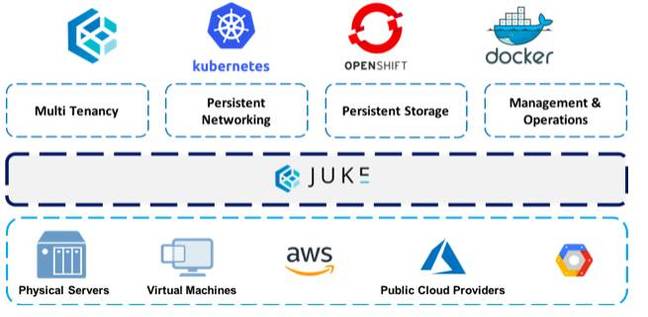This article is more than 1 year old
HTBASE struts into diner, thumps Juke box: Eyyy, let's migrate some containerised apps
Play container records on any private or public cloud turntable
HTBASE has pulled the covers off Juke, its hybrid and multi-cloud container deployment and migration kit.
The Canadian startup said it can be used to move containerised applications between microservices environments on-premises and in public clouds.
The flavour of the thing can be seen in the diagram:
Juke is an abstraction layer for containers across heterogeneous physical and virtual servers on-premises and in the public cloud, stitching these together to form a kind of multi-cloud data centre resource pool embracing compute, storage and networking.
HTBASE said it has software-defined networking and storage fabrics that pool cloud resources together into a single entity consumable by orchestration platforms such as Kubernetes and Docker Swarm.
Individual microservices can be dispersed across, and migrated between, cloud platforms and stateful volumes can be made highly available. Migration involves no reconfiguration of micro-services.
The platform supports AWS, Azure, and GCP public clouds.
HTBASE said it builds a single persistent layer of storage through its software-defined storage system, Juke FS, which applications and containers access, and which features high availability, snapshotting and replication. Customers can scale storage with disks from multiple clouds, presenting them as a single pool, and tier data across clouds, so data is close to the applications, which can withstand cloud failures.
Users can add storage and compute independently from different cloud providers, based on application requirements, such as cost, region, performance, and so on.
The software-defined networking fabric enables layer 2 connectivity across multiple clouds, binding all nodes with local IP addresses. DevOps professionals can add nodes from disparate cloud service providers and manage them all as a single local entity.
Applications can be based around business requirements, while maintaining storage and networking persistency across clouds.
HTBASE said Juke has a built-in marketplace with a catalogue of operating systems, applications, orchestration tools and more. It includes load balancer services for clustered applications, auto-scaling of cloud resources, container performance monitoring, provisioning and orchestration services, including lifecycle management.
Juke features claimed intelligent data distribution and locality based on application policies for performance and cost optimisation.
HTBASE said Juke is multi-cloud control and data fabric, rather than just another orchestration tool. These, it claimed, force you to configure and maintain external storage, networks, clouds and resources which are each isolated and without persistency.
Juke has an open API and can be plugged into different orchestration platforms, such as Kubernetes and openShift, creating the single cloud infrastructure, with persistent resources.
Multi-cloud abstraction layers for data and application management are proving popular. VMware, Nutanix, Hedvig, and MayaData to name a few are all at it.
Having an anti-lock-in defence against public cloud suppliers is great but you do, however, have a dependency upon HTBASE. Lock-in moves up the stack, so to speak.
A full-featured trial version of Juke limited to four nodes is available here, and an unrestricted enterprise version will be billed annually per node when deployed on-premises, or billed per hour when consumed through public cloud services. It may be worth a pilot run to get better acquainted with its features and discover any limitations. ®

